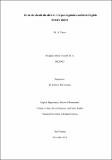| dc.description.abstract | Scholars of literary dialect have often found themselves defending the focus of their study against allegations of exaggeration and stereotyping, particularly in areas like Ireland, where a legacy of colonialism and of derogatory representations of those who speak the non-fictional dialect in question have led to linguistic insecurity and sensitivity towards fictional dialect representations. As a result, literary dialect studies have traditionally focused on accuracy-based comparisons between literary and non-fictional linguistic varieties. Recently, some scholars have begun to grant literary dialect more attention, often employing quantitative linguistic methodologies in order to perform more scientific analyses of literary dialect. This dissertation aims to look beyond the question of authenticity in an investigation of Irish English literary dialect of the twentieth-century Abbey Theatre catalogue. This study treats the literary dialect involved as a discrete linguistic variety, related to real-life Irish English but deserving of a comprehensive analysis that does not rely on that relationship, and that does not have an accuracy judgement as its goal.
To that end, the Corpus of Hiberno-English Literary Dialects (CHELD) was created, containing over 600,000 words of dialect from fifty texts by seventeen authors whose work, these texts included, has been produced by the Abbey Theatre, Ireland's national theatre. In this dissertation, the construction of this corpus is detailed, from the digitization and annotation of texts to the analytical process. The corpus is then explored along a number of linguistic and sociolinguistic variables in order to approach a more complete picture of the linguistic characteristics of twentieth-century Irish English theatrical dialect of the Abbey. In addition, more specific studies are carried out; in the first, the language of the Abbey's founders is explored in order to investigate how these authors' language use can be linked to their political and literary aims. The second examines the language of Lennox Robinson and Sean O'Casey for evidence of an attempt to differentiate their work from that of the Literary Revival. The final study focuses on an analysis of the CHELD texts by premiere site in order to explore the possibility of an 'Abbey linguistic style' specific to plays written originally for an Abbey audience. The thesis concludes by looking to establish a broad picture of the characteristics of Literary Hiberno-English. | en_US |


